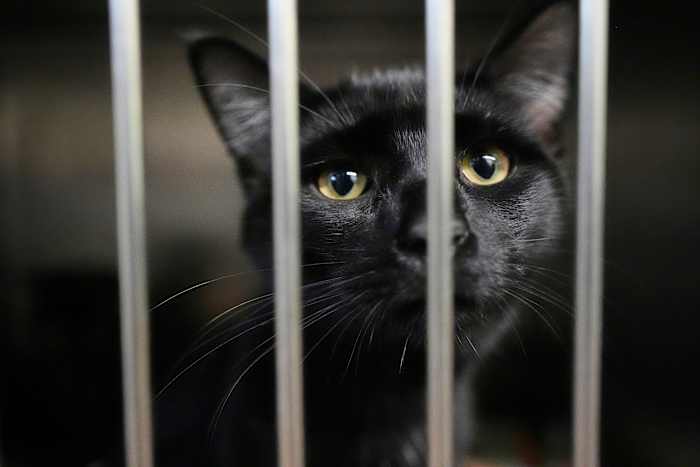**Amid Government Shutdown, Pet Owners Struggle as SNAP Payments are Delayed**
NEW ORLEANS — Sarah Lungwitz has been worried not only about feeding her two teenage daughters due to disrupted Supplemental Nutrition Assistance Program (SNAP) payments, but also about feeding her family’s cat and two dogs.
Help has arrived for now, she says, after an Illinois nonprofit arranged for volunteers to give her a grocery gift card last week to buy food both for herself and her pets. This assistance is part of growing efforts to help struggling pet owners stretch their dollars amid delayed SNAP payments during what has become the longest government shutdown on record.
“I don’t even make enough money for all my bills, let alone groceries,” said Lungwitz, a 46-year-old auto parts store worker. She has been worried she might have to surrender her cat, Bambi, and her two dogs, Spike and Chloe.
The Supreme Court on Friday granted the Trump administration’s emergency appeal to temporarily block a court order to fully fund SNAP food aid payments amid the government shutdown, even though residents in more than half a dozen states have already received the funds. This ongoing uncertainty is placing a strain on animal shelters.
Though SNAP benefits cannot be used to buy pet food, the program helps low-income families free up money to purchase kibble. Many owners also supplement or entirely feed their animals with human food purchased using SNAP benefits, according to Stephanie Hicks, executive director of Care for Pets, a Rockford, Illinois nonprofit that helped Lungwitz and others. Some volunteers even walked grocery aisles alongside struggling pet owners.
The Humane World for Animals (formerly the Humane Society of the United States) estimates that more than 20 million pets live in poverty with their families. Economic hardship is one of the leading reasons animals are surrendered to shelters, spokesperson Kirsten Peek said.
While it is still too early to tell if the current shutdown will cause a surge in surrenders, groups are actively collecting pet food, concerned that the financial strain on hundreds of thousands of furloughed workers without paychecks may increase the number of animals given to shelters.
“An increase in surrenders is always a concern when an influx of people fall on hard times,” Peek added.
**Shelters Take Action to Support Pet Owners**
In Louisiana, one shelter is considering diverting funds from veterinary care to purchase pet food. The SNAP delays come at a particularly bad time for the Companion Animal Alliance in Baton Rouge, which recently lost a donor and was forced to halt a program that distributed pet food to around 200 families each month.
“People are exceptionally panicking. I don’t know what a better word would be,” said Paula Shaw, the shelter’s director of access to care. She noted that it was common for SNAP recipients to give their own food to their pets, prompting the shelter to provide information on human foods that owners could add to pet food to make it last longer.
After Charley’s Angles Pet Initiative in Massachusetts issued a plea on Facebook last week, offers of pet food and donations via Venmo poured in immediately. “We’re expecting, at least in the short term, that there’s going to be a surge,” said Kandi Finch, a groomer who named her nonprofit after a beloved pet.
**Spike in Demand at Pet Food Pantries**
That surge is already happening at New Leash on Life, a shelter in Lebanon, Tennessee, just outside Nashville. The number of families using its pet food pantry jumped to 125 in October, up from a typical range of 75 to 100 per month, said executive director Angela Chapman.
“We’d rather help them with their food than have to surrender a pet,” she said.
In New Orleans, Zeus’ Rescues handed out twice the usual amount of pet food in October, marking the highest demand the organization has seen in 20 years. Founder Michelle Cheramie described the situation as “heartbreaking,” noting that some people are so desperate they have been abandoning animals in the shelter’s yard.
Among those seeking help was Katie Saari, who is unemployed due to health issues and struggling to set up SNAP interviews amid the shutdown. Out of money, she needed food for her two dogs.
“They’re more important to me than I am, so I want to make sure they’re fed first,” Saari said. “They’re my babies.”
Aware of the problem, many food pantries are also stocking pet food, said Kim Buckman with Feeding Missouri, a coalition of food banks in the state.
“We do know a lot of people will feed their pets before themselves,” she said. “In some cases, that is their emotional support animal.”
**Pet Companions Support Mental Health**
Such is the case for Lungwitz, who suffers from PTSD and severe depression. A psychiatrist advised her to get a dog because they require walks. That’s how she came to have her Chihuahua. Her American Bulldog, an 80-pound bundle of “pure muscle,” helps her feel safe.
The domestic violence survivor says having her pets has allowed her to venture back into the community and secure a job. But money is so tight that she sometimes turns to food banks, including once getting doughnuts for her 17-year-old daughter’s birthday.
“I’m struggling,” she said.
___
Reporting by Hollingsworth from Mission, Kansas.
https://www.clickorlando.com/news/national/2025/11/08/families-on-snap-worry-about-not-just-feeding-themselves-but-also-their-pets/


